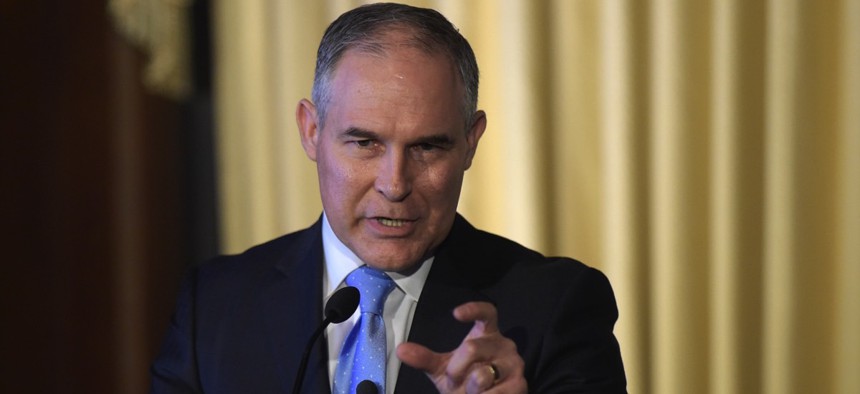Pruitt’s Local EPA Priorities Don’t Align With Proposed Agency Cuts

EPA Administrator Scott Pruitt Susan Walsh / AP Photo

Connecting state and local government leaders
The White House wants to slash or do away with grants and programs the new administrator indicated are good for cities.
WASHINGTON — Environmental Protection Agency Administrator Scott Pruitt, almost two weeks officially on the job, discussed his priorities with a room full of U.S. mayors on Thursday. But many of those priorities conflict with the White House’s proposed budget cuts for his agency.
On the agenda during Pruitt’s discussion with the U.S. Conference of Mayors Leadership Meeting in the nation’s capital: Nonattainment areas failing to meet federal air quality standards; polluted brownfield industrial sites; the Superfund program that addresses contamination and environmental emergencies; and failing local water infrastructure.
Mayoral insight is needed now more than ever with state grants and air and water programs set to be cut by 30 percent, brownfield grants targeted for elimination and the feds looking for cities to shoulder more of the burden.
“We need stories,” Pruitt said. “We need illustrations about how important the brownfields program is to creating jobs and the environmental benefits that have been achieved and communities taking ownership of those things.”
The White House’s plan aims to reduce EPA staff by one-fifth and eliminate dozens of initiatives, according to The Washington Post.
Pruitt said he’s interested in protecting the environment but with a “keen interest to jobs and growth as well.”
“Water infrastructure—we know when it goes wrong, it goes wrong badly,” said Pruitt, who previously served as Oklahoma’s attorney general.
Citizen health and water quality remain a national issue, so at least some grants should be preserved.
As for air quality nonattainment, Pruitt said he wanted to work with counties and cities to set benchmarks.
On other subjects, like the tax exemption for municipal bonds, Pruitt is less well-versed. Carmel, Indiana, Mayor James Brainard had to explain that if Capitol Hill leaders eliminate the exemption, cities will have to “spend roughly 40 percent more to get the same amount of water infrastructure in place.”
Pruitt’s response: That didn’t come up during his confirmation.
Pruitt expressed frustration that projects to remediate contaminated land, like the decommissioning of the Hanford nuclear production facility in Washington state, have remained on the books for decades. He said he plans to meet with governors and mayors to complete such efforts.
With Pruitt, a few proposed White House budget cuts appear negotiable, and he told mayors he was a good listener. That said, he’s taken heat from environmentalists of late for questioning the human role in climate change and accusations of lying under oath during his confirmation hearing.
“Civility in our discourse is really, really important,” Pruitt said.
Dave Nyczepir is a News Editor at Government Executive's Route Fifty and is based in Washington, D.C.

NEXT STORY: County Officials: We’ve Seen What Medicaid Expansion Can Do





